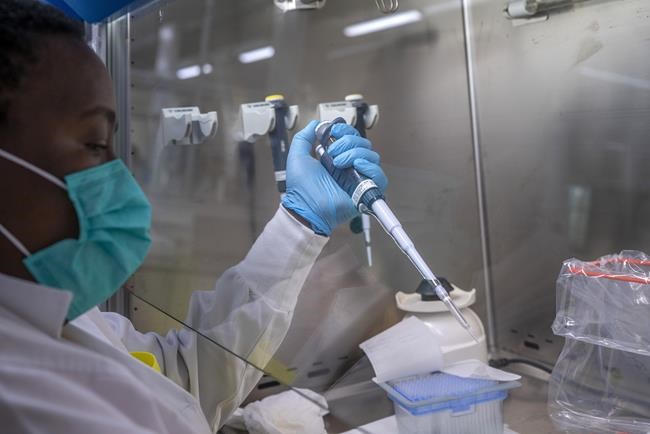Vaccine protection against Omicron variant still largely unknown: experts
Advertisement
Read this article for free:
or
Already have an account? Log in here »
To continue reading, please subscribe:
Monthly Digital Subscription
$0 for the first 4 weeks*
- Enjoy unlimited reading on winnipegfreepress.com
- Read the E-Edition, our digital replica newspaper
- Access News Break, our award-winning app
- Play interactive puzzles
*No charge for 4 weeks then price increases to the regular rate of $19.00 plus GST every four weeks. Offer available to new and qualified returning subscribers only. Cancel any time.
Monthly Digital Subscription
$4.75/week*
- Enjoy unlimited reading on winnipegfreepress.com
- Read the E-Edition, our digital replica newspaper
- Access News Break, our award-winning app
- Play interactive puzzles
*Billed as $19 plus GST every four weeks. Cancel any time.
To continue reading, please subscribe:
Add Free Press access to your Brandon Sun subscription for only an additional
$1 for the first 4 weeks*
*Your next subscription payment will increase by $1.00 and you will be charged $16.99 plus GST for four weeks. After four weeks, your payment will increase to $23.99 plus GST every four weeks.
Read unlimited articles for free today:
or
Already have an account? Log in here »
Hey there, time traveller!
This article was published 08/12/2021 (1464 days ago), so information in it may no longer be current.
Experts and global health leaders say it’s still too soon to tell whether the Omicron variant will significantly threaten immunity gained from current COVID-19 vaccines as calls grow in some corners for expanded booster shots.
Pfizer released a press release Wednesday saying that while two doses of its vaccine appear to be less effective against the new threat, a booster dose may offer important protection by raising antibody levels.
Pfizer’s data, which hasn’t been reviewed by the scientific community, also suggested that two doses of the vaccine should still protect against severe disease with Omicron, since the variant’s mutations don’t appear to hamper T-cell defences that fight the virus after infection sets in.

The Omicron variant, discovered late last month, carries an unusually large number of mutations on its spike protein, which is what the current mRNA vaccines target.
Cynthia Carr, an epidemiologist in Winnipeg, said the extent of those changes are still unknown. But even significant mutations likely won’t hamper vaccine effectiveness entirely.
Carr likened the antibody response to a baseball fielder wearing a glove, with the ball representing the COVID-19 virus trying to enter our cells. A fielder can catch the ball to make the out — extinguishing the viral threat before it even embeds itself.
“If that ball changes shape to a football, it doesn’t quite fit the glove, but you still know what you’re looking for and it’s not a zero chance of catching the ball,” Carr said. “It doesn’t evade entirely … but it’s more challenging.
“But that’s where your T-cells are so important, because they get in there and chase the antigen and kill it to help the antibodies that are blocking it.”
Pfizer said one way to increase protection against the Omicron variant is with a third dose of its current vaccine, developed with Germany’s BioNTech. The pharmaceutical company and others are also working on an Omicron-specific shot that will likely need clinical trials before it’s made available to the public.
Omar Khan, a biomedical engineering expert with the University of Toronto, said third doses of the already approved jabs work by boosting antibody levels, which is especially important for older members of the population and those with weakened immune systems.
Khan said antibody levels naturally drop over time and are re-triggered when exposed to the pathogen.
“But in the face of imminent exposure and to save people from being infected, you can boost their antibody levels (with a third dose),” he said. “That way, when they’re imminently exposed, they’re already ready to fight because they have more antibodies.
“They’re a little less efficient, but there’s enough of them to cover it.”
Scientists are still racing to learn how easily Omicron spreads, whether it causes more severe illness than previous variants, and how much it might evade the protection of prior vaccination.
Pfizer said blood samples taken a month after a booster showed Omicron-neutralizing antibody levels that were similar to amounts sparked by the initial two doses, which proved protective against earlier variants.
While some Canadian experts urge jurisdictions to accelerate third-dose rollouts to larger portions of the population — most provinces allow boosters for older or immunocompromised people and health-care workers six months after their second dose — Khan said more research is likely needed before expanding eligibility to everyone.
“Informed decisions need scientific data and we need more time for that data,” he said.
The World Health Organization’s chief scientist Dr. Soumya Swaminathan, shared a similar message in a briefing Wednesday, saying “it’s premature” to know whether a drop in neutralizing antibodies will result in “significant reduction in vaccine effectiveness.”
However, Jason Kindrachuk, a virologist with the University of Manitoba, said it’s better to be “proactive” on third doses in order to slow transmission of Omicron before it becomes a larger problem in Canada — and to continue staving off the still-circulating Delta variant.
“We’re getting data telling us that two doses is not going to offer us complete protection from infection (against Omicron) and we’re going to see more breakthroughs,” he said, pointing to preliminary studies from South Africa as well as Pfizer’s non-reviewed data.
“We have to do everything we can to protect and conserve our health-care system and certainly the health of those (vulnerable) people, but also stop transmission because the more transmission there is, the more potential for new variants to emerge.”
— With files from The Associated Press.
This report by The Canadian Press was first published Dec. 8, 2021.





